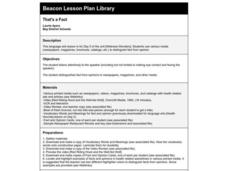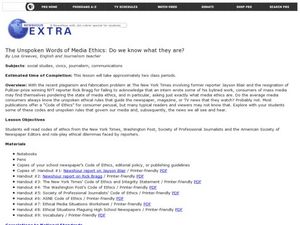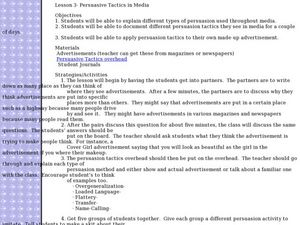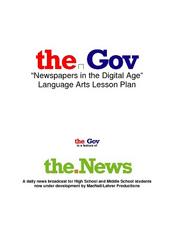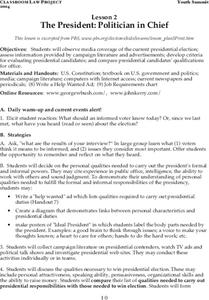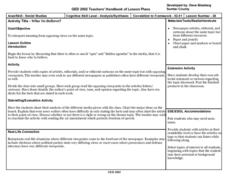Curated OER
That's a Fact
Third graders use various media (newspapers, magazines, brochures, catalogs, etc.) to distinguish fact from opinion
Curated OER
Using a Graphic Organizer to Critically Observe Televised News Broadcasts
Students compare two television news broadcasts. They discuss how to organize information when comparing two objects and read and discuss two books to create a Venn diagram to compare both books. After creating the diagram, they view...
Curated OER
The Unspoken Words of Media Ethics: Do we know what they are?
Students read codes of ethics from the New York Times, Washington Post, Society of Professional Journalists and the American Society of Newspaper Editors. In this Civics lesson, 10th graders role-play ethical dilemmas faced by reporters.
Curated OER
Writing a press release
Students scan through a selection of newspapers or online stories from the Newsround website and chose one story each. They use the top TWO paragraphs of the story to complete the grid of the four W's.
Curated OER
Cartoons for the Classroom: What's Replacing Our Newspapers?
In this current events worksheet, students analyze a political cartoon about the changing newspaper industry and respond to 3 talking point questions.
Curated OER
Capitol Visitors Center, Post-Visit Lesson Plan, Grades K-3
Students visit the Texas Capitol Visitors Center. They review the importance of the Lone Star as a state symbol. They create a collage of Lone Stars using various print media (newspapers, magazines, travel literature and advertisements.)
Curated OER
How Does Advertising Affect You?
Students examine advertisements from magazines. They are asked questions about each ad and what perceptions they get from the advertisement. They also identify the goal of the ad.
Curated OER
Americas Idols
Young scholars engage in a lesson that is concerned with the concept of American Idol and the controversy that surrounds the broadcast. They conduct research using a variety of resources and write paragraphs that state opinions about the...
Newseum
Editorials and Opinion Articles
Reading the news is fun, and that's a fact! With the lesson plan, scholars differentiate between fact and opinion as they read editorial articles. They complete a worksheet to analyze the information before writing their own editorials...
Curated OER
Breaking News English: BBC Nets Best Net News Award
In this English worksheet, students read "BBC Nets Best Net News Award," and then respond to 30 fill in the blank, 25 short answer questions about the selection.
Curated OER
Writing Summaries
Practice summary writing with informational texts. Young readers create summaries after reading magazine articles, newspaper articles, or other forms of informational texts. Readers use the GRASP strategy (read text, write what you...
Curated OER
Creating a Colonial Newspaper
Students identify people, events and issues of importance during the French and Indian War and compare them with issues that only affected New Hampshire. They discover how newspapers gave people a sense of identity.
Curated OER
Media Literacy
Young scholars watch a video a pre-taped TV commercials. They define propaganda and re-watch the video. Students choose a poster from Posters American Style and journal about their observations. Young scholars use the computer lab to...
Curated OER
Persuasive Tactics in Media
Young scholars present a skit to the class and explain what persuasion tactic they used. In this persuasive tactics lesson, students discuss methods of persuasion used in various advertisements. The teacher leads and gives examples of...
Curated OER
Massaging the Message: The Media Speaks
Young scholars watch video of TV news clips centered on the House of Commons and then complete an information sheet.
Curated OER
Not Getting the News about the Stamp Act
How did American colonists react to the Stamp Act of 1765? Your young historians will examine primary source material by reading excerpts from a transcription of the Pennsylvania Gazette and then identifying the sentiments expressed by...
Curated OER
Newspapers in the Digital Age
Is journalism more or less reliable with the influx of Internet sources? Learners investigate the issues of freedom of speech, journalistic ethics, and social responsibility in the age of Twitter and Facebook. After examining the...
Curated OER
School-Home Links/Book Links
Get youngsters reading at home and their parents involved with this at home reading assignment. This resource consists of a ready-to-use handout for documenting at-home reading. Formatted as a letter home to parents, this activity calls...
Sargent Art
Improvisation: Dada and Surrealism
Images of works by Salvador Dali, Luis Bunuel, and Man Ray launch a study of Dada and Surrealism. After critiquing works by these and other artists, class members gather their own images and arrange them into a cohesive composition.
Nemours KidsHealth
Alcohol: Grades 9-12
Two activities ask high schoolers to consider the role of alcohol culture in their lives. First, groups analyze the types of appeals used in newspaper ads for alcoholic drinks and compare those images with what they have observed....
Curated OER
Dissecting the Media
Young scholars examine an editorial point of view in journalism and explore how this contributes to the West's understanding of events in the Middle East. They discuss the concepts of objectivity and subjectivity, and how tone and...
Curated OER
The President: Politician in Chieft
Students explore the role of the U.S. President and the media coverage in presidential elections. They discuss what it means to be informed, the issues they consider most important, and reflect on what they learned from their interviews....
National Endowment for the Humanities
Chronicling America: Uncovering a World at War
As part of a study of World War I, class members read newspaper articles from the time that urge American involvement, non-involvement, or neutrality. Using the provided worksheet, groups analyze the articles noting the central argument...
Curated OER
Who To Believe?
Students interpret meaning from opposing views on the same topic, and discuss that there is often so much "spin" and "hidden agendas" in the media.


